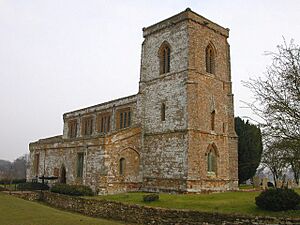Church of St Mary the Virgin, Fawsley facts for kids
Quick facts for kids Church of St Mary the Virgin, Fawsley |
|
|---|---|
| Church of St Mary the Virgin | |
 |
|
| OS grid reference | SP 56537 56792 |
| Location | Fawsley, Northamptonshire |
| Country | England |
| Denomination | Anglican |
| History | |
| Dedication | Mary, mother of Jesus |
| Architecture | |
| Heritage designation | Grade I |
| Designated | 1968 |
| Completed | approximately 1209 |
| Administration | |
| Parish | Fawsley |
| Diocese | Peterborough |
| Province | Canterbury |
The Church of St Mary the Virgin is a historic church located in Fawsley, Northamptonshire, England. It's a Church of England parish church, meaning it serves the local community. This beautiful church was built a long time ago, in the 13th century. It's so important that it's a Grade I listed building, which means it's protected for its special history and architecture.
Discovering the Church's Past
The church you see today was built in the 13th century. People believe it started around 1209. It was built where an older wooden Anglo-Saxon church once stood. At first, it was a small chapel connected to St John the Baptist Church in Blisworth.
Later, during a time called the Dissolution of the Monasteries, the Knightley family changed the area. They tore down most of the village to create land for sheep. But the church was saved! It had been given land to set up a special fund in Bedfordshire.
In 1690, part of the church called the chancel was rebuilt. Over time, statues of the Knightley family were placed inside. Many family members were buried there. The church was officially recognized as a Grade I listed building in 1968. This status was updated in 1987.
In 2015, some copper was stolen from the church roofs. This caused rain damage inside. Luckily, people worked hard to raise money to fix it.
The Tower and Its Ancient Bells
The church tower holds a set of four bells. These bells are very special! They are the oldest set of four bells that were all made by the same company at the same time. They were cast by W. Chamberlain of London around 1440.
Each bell has a unique message carved into it:
- The smallest bell (Treble) says: SANCTE BOTOLFE ORA PRO NOBIS (Saint Botolph, pray for us).
- The second bell says: IN MULTIS ANNIS RESONET CAMPANA JOHANNIS (May John's bell resound for many years).
- The third bell says: SIT NOMEN DOMINI BENDICTUM (Blessed be the name of the Lord).
- The largest bell (Tenor) says: JOHANNES EST NOMEN EIUS (John is his name).
All four bells also have three special marks that show who made them. These marks are like old-fashioned logos! The bells still have their original "canons," which are the loops at the top used to hang them.
The wooden frame holding the bells is from the early 1600s. It was repaired in 1965 and 1966. The bells were also fixed up so they could swing and chime better. In 1992, volunteers made the frame even stronger. This allowed the bells to be rung in a special way called full circle ringing. A celebration was held on September 26, 1992, to mark this improvement.
The Washington Family Connection
In 1720, people noticed a special carving outside the church entrance. It was the coat of arms of the Washington family. This was likely because Reverend Lawrence Washington once owned land in the area, including the church. He was the great-great-grandfather of United States President George Washington!
The shield was later hidden by stones. But it was found again in 1885 and protected with a glass case. The church also has beautiful stained-glass windows with the Washington family's coat of arms. These windows were moved from Sulgrave Manor, which was the Washington family's old home.
 | William M. Jackson |
 | Juan E. Gilbert |
 | Neil deGrasse Tyson |

